|
|
|
Sort Order |
|
|
|
Items / Page
|
|
|
|
|
|
|
| Srl | Item |
| 1 |
ID:
183991
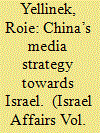

|
|
|
|
|
| Summary/Abstract |
This article examines China’s media strategy and activities towards Israel, underscoring its recent increase in intensity. By way of doing so, the article explores Beijing’s use of journalism and other Israeli media outlets on the one hand, and the employment of direct Chinese soft power tools, from China Radio International (CRI), to the establishment of Chinese institutes in Israel, to public and media activities of Israel-based Chinese diplomats.
|
|
|
|
|
|
|
|
|
|
|
|
|
|
|
|
| 2 |
ID:
183497
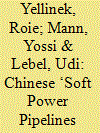

|
|
|
|
|
| Summary/Abstract |
The article examines China’s ‘soft power’ invested in Middle Eastern countries from 2000 to 2018 by offering three main ‘Soft Power Pipelines Diffusion’ (SPPD): the media, popular culture and education. The paper focuses not only on China’s soft presence but also on the response and reception of its power in Middle Eastern Arab countries. China’s soft power presence and efforts were found to be efficient and to contribute to China’s image in the region and to its transformation into an attractive destination for cooperation in many soft areas.
|
|
|
|
|
|
|
|
|
|
|
|
|
|
|
|
| 3 |
ID:
175699
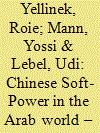

|
|
|
|
|
| Summary/Abstract |
Confucius Institutes are one of the major ways China invests Soft-Power in the world. This paper will examine the Confucius Institutes in universities in Arabic speaking countries from 2006 to 2020. It will focus on the response and reception of China’s Soft-Power in these countries. An initial index for examining the success of these institutes will be offered, which can also be applied to educational-cultural institutes in general. The following review and analysis of data point to the conclusion that Confucius Institutes, as a tool of Chinese Soft-Power, have effectively penetrated the Arab world and are welcomed without significant criticism.
|
|
|
|
|
|
|
|
|
|
|
|
|
|
|
|
| 4 |
ID:
184393
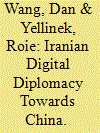

|
|
|
|
|
| Summary/Abstract |
Digital diplomacy is an efficient tool for building close relationships between countries, especially when it comes to people-to-people diplomacy (P2P). This article aims to explore how the Iranian embassy in Beijing uses Chinese social media and reveals the motivations and changes in its behaviour. The main finding was that 2019 was a turning point; before 2019, the embassy messages were more informative without targeting specifically its Chinese audience, and since 2019 the messages have been showing deeper understating the local discourse and, therefore, have been more tailored for its Chinese audience. The main reasons for that were the place of Iran in the China-US trade war, the role of the EU in uplifting Iran's status in the international community, and the Ambassadors' characteristics and background, which switched at the end of 2018.
|
|
|
|
|
|
|
|
|
|
|
|
|
|
|
|
| 5 |
ID:
177520
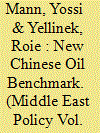

|
|
|
|
|
| Summary/Abstract |
China introduced a new oil benchmark in March 2018, part of a bid to establish its position as an economic superpower. This article analyzes the impact of this new index on the Middle East, a key region where much of the oil on which the index is based originates, by focusing on market transparency, market determination, government involvement, physical accessibility, and the internal Chinese dialogue. The article then discusses the political, financial, and economic view from the Middle Eastern perspective. It finds that China still has a long way to go before it can turn the new oil benchmark into an international standard. In addition, the Shanghai Stock Exchange was launched just before the escalation of the trade dispute between the world's two largest economies, the United States and China. While this fight could hurt the traditional indices and elevate China's new oil benchmark, the coronavirus, which has spread worldwide from China, is another factor that may affect the quality and impact of this new index.
|
|
|
|
|
|
|
|
|
|
|
|
|
|
|
|
| 6 |
ID:
182036
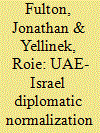

|
|
|
|
|
| Summary/Abstract |
The announcement of normalized diplomatic relations between Israel and the United Arab Emirates (UAE) is a significant event in Middle East international politics, marking the first new regional partnership for Israel since Jordan in 1994. This paper uses a levels of analysis approach to examine the domestic, regional, and systemic pressures that influenced leaders in the two countries to make this bold decision. It argues that the pressures at the domestic and systemic levels are important considerations, but the dynamics at play in the Middle East regional security complex are ultimately more important factors in explaining normalization.
|
|
|
|
|
|
|
|
|
|
|
|
|
|
|
|
|
|
|
|
|